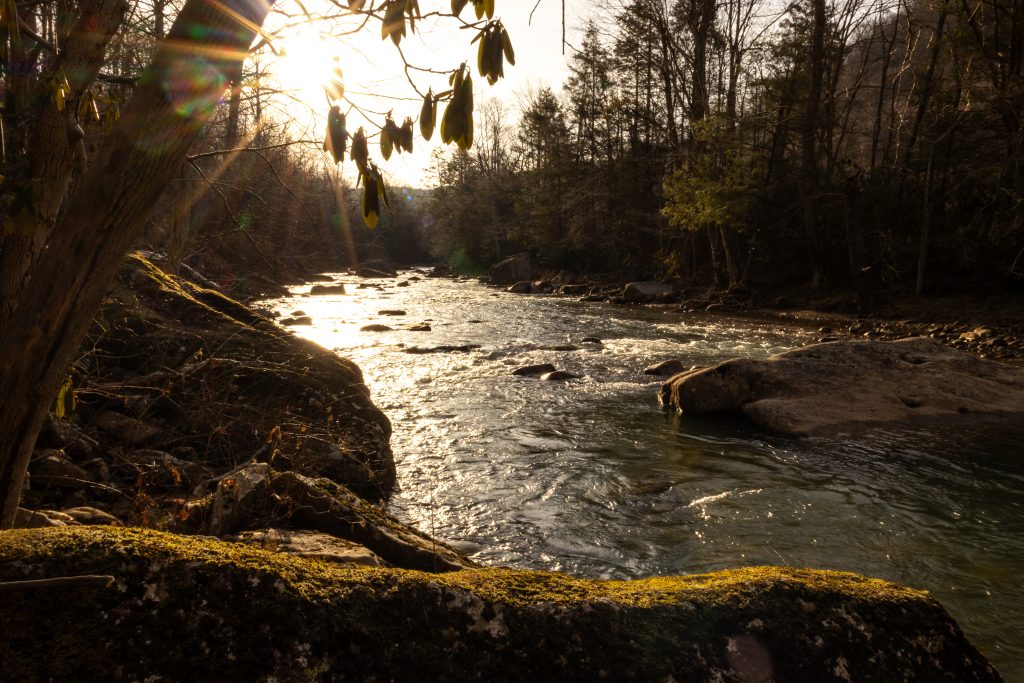Front Porch Blog
Cherry/ Gauley River named among America’s most endangered rivers; thousands oppose coal-hauling in the Monongahela National Forest; new violations; and a call to action

Pollution caused by South Fork Coal Company has landed West Virginia’s Gauley River watershed on a list of the most endangered rivers in the country. The nonprofit organization American Rivers announced the designation on April 16, just weeks after the bankrupt coal company was cited yet again by state regulators, this time for causing “iron-staining and sludge deposits” in Becky Run, a high quality trout stream according to the West Virginia Division of Natural Resources.
South Fork Coal Company’s operations surround and impact the headwaters of the South Fork of Cherry River, with additional runoff from the company’s mines, haul roads and coal processing plant also impacting the North Fork of Cherry River, Laurel Creek and Big Clear Creek, all of which are in the Gauley River watershed.
To learn how you can join the emerging campaign, tune in to our ‘Don’t Mine the Mon’ webinar on May 21 at 1 p.m. (as of part of the ‘Our Land, Our Home’ webinar series) or on May 29 at 6 p.m.
In February, state regulators discovered that the company’s Clearco coal loading and waste facility near Rupert, West Virginia, was discharging black water into Big Clear Creek, and that South Fork Coal had failed to add the needed kiln dust to coal waste stored on site in order to protect nearby streams from acid mine drainage and other contaminants.
According to documents obtained from the West Virginia Department of Environmental Protection, the company cleaned up the black water spill within a couple of days, but was unable to treat the on-site waste until some point in April, as the bankrupt coal company had racked up a debt of $314,000 to Mintek Resources, the vendor that supplies kiln dust to the facility. Ultimately, Mintek agreed to accept payment of only $265,000, forgive the remaining $49,000 debt and resume providing kiln dust on a pre-pay basis.
In April, the Office of Surface Mining Reclamation and Enforcement received thousands of comments from citizens opposing South Fork Coal’s request for an exception to the federal ban on hauling coal through the Monongahela National Forest. Back in January, then-acting head of the agency Sharon Buccino ordered the company to cease hauling coal through the Mon. But in February, after the Trump administration took over, the Department of the Interior Office on Hearings and Appeals lifted this closure order at the request of South Fork Coal.
“South Fork Coal Company’s operations have left a trail of pollution, debt and disregard for both public lands and community health,” said Olivia Miller, program director of the West Virginia Highlands Conservancy. “Pollution in high-quality trout streams and the continued use of roads through the Monongahela National Forest raises serious questions about oversight and accountability. West Virginians deserve stronger protections for our public lands and waterways.”
Since late 2023, Appalachian Voices has worked closely with the West Virginia Highlands Conservancy, Allegheny-Blue Ridge Alliance and other partners to defend the Cherry River from South Fork Coal’s negligence, and to resist this coal company’s encroachment into the Monongahela National Forest. Along with our partners, App Voices has sued the U.S. Forest Service for allowing South Fork to unlawfully use public Forest Service roads, and South Fork Coal for pummeling the Cherry River with pollution. The company’s bankruptcy has put both of these cases on hold, as well as any potential administrative challenge to the DOI’s reopening of South Fork’s haul road through the Mon. App Voices and our partners have retained legal counsel in Delaware, where the bankruptcy is unfolding, and are exploring our options for continued engagement.
Recent executive orders signed by Donald Trump that aim to open up public lands for coal mining are now adding to the threat. But in order to win, this campaign needs to grow, and we need you to be a part of it.
Join us at 1 p.m. on May 21, or 6 p.m. on May 29 for ‘Don’t mine the Mon,’ a webinar and initial campaign vision discussion for West Virginians and others who want to protect the Monongahela National Forest and the Gauley River watershed from destructive mining practices.
PREVIOUS
NEXT
Related News

Leave a comment
Your email address will not be published. Required fields are marked *
3 responses to “South Fork Coal Company: ‘a trail of pollution, debt and disregard’”
-
I’ve seen how such solution can ruin health and lives. someone is making a profit. I don’t buy that they can’t afford to do it right. Quit or give Rupert free coal or pay up.
-
Please STOP destroying our natural resources only to make a profit for corporations that care for nothing but themselves and their shareholders.
-
Protect our national resources!

Leave a Comment